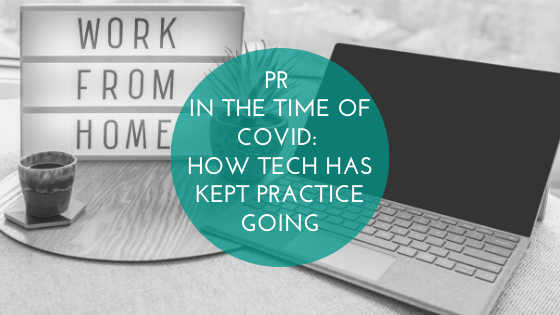
PR in the time of Covid: how technology has kept the practice going
Back in March, the UK entered a period of lockdown in an attempt to stop the spread of Coronavirus.
The public health crisis has not been easy on practitioners overall. The profession’s relatively strong job security has been shaken by announcements such as M&C Saatchi’s salary cuts and Manchester agency SKV Communications being forced to wind up the business. It’s not all bad news though, as Edelman has guaranteed that all of its 6,000 employees’ jobs are safe.
Practitioners have found themselves made redundant, furloughed, or working from home, sometimes juggled alongside challenges like lack of a suitable working space or available childcare. Even for the 31% of practitioners that previously worked from home for at least one day a week, the current sustained home working is surely taking a toll. However, it is worth it to keep ourselves safe from a highly contagious and sometimes fatal virus.
As lockdown measures begin to ease and some agencies begin to return to their offices, it is worth reflecting on how the profession coped during the difficult time. The picture may not be as bleak as it initially seems.
Public relations practitioners are lucky in that it takes a relatively basic amount of kit to complete tasks. Most responsibilities can be completed armed with either a laptop or smart phone and internet access. Prior to lockdown, there was debate on whether it was appropriate to continue pitching to journalists, and how to go about it if so. Social media enabled practitioners to share opinions and best practice with each other, including the weekly #PowerAndInfluence Twitter discussion that recently explored the ethics of pitching for new business during a pandemic.
“Ethical Pitching in a Pandemic” – @marybethwest and @rfzeitlin discuss with the #PowerAndInfluence community the dangers and opportunities that come with giving and receiving free #PR and #Comms advice (full conversation in the link below) “https://t.co/tIz7eS6sJT” pic.twitter.com/OIBjJkEMl1
— Ella Minty (@EllaMinty) June 24, 2020
It hasn’t been all work and no play, either. TechJPR, a Facebook group for technology PR and journalism professionals, has run virtual quiz nights for its members, enabling PR practitioners to take advantage of a socially distant but still social aspect of media relationship building.
Despite mounting financial uncertainty for businesses, many have continued to invest in their public relations and communications functions, as urged by the PR Week editor back in April. So, new business pitches have taken place via video conference. Press releases have been sent, and instead of the usual posed handshake photographs, accompanying images are Zoom screenshots featuring a grid of faces. New brands are still launching, and some practitioners have applied for new jobs, undergone interviews, and started a new role entirely virtually from their own homes.
Much has been said in the past about how technology has affected public relations and will impact its future. I am sure that more scholarly viewpoints than mine will be released when the pandemic is over and there has been enough time and distance to study this extraordinary period in our profession’s history. For now, though, we can definitely say that practitioners have needed to rapidly adapt to this (hopefully temporary) new normal, and have achieved this with the help of the technological tools available to them.